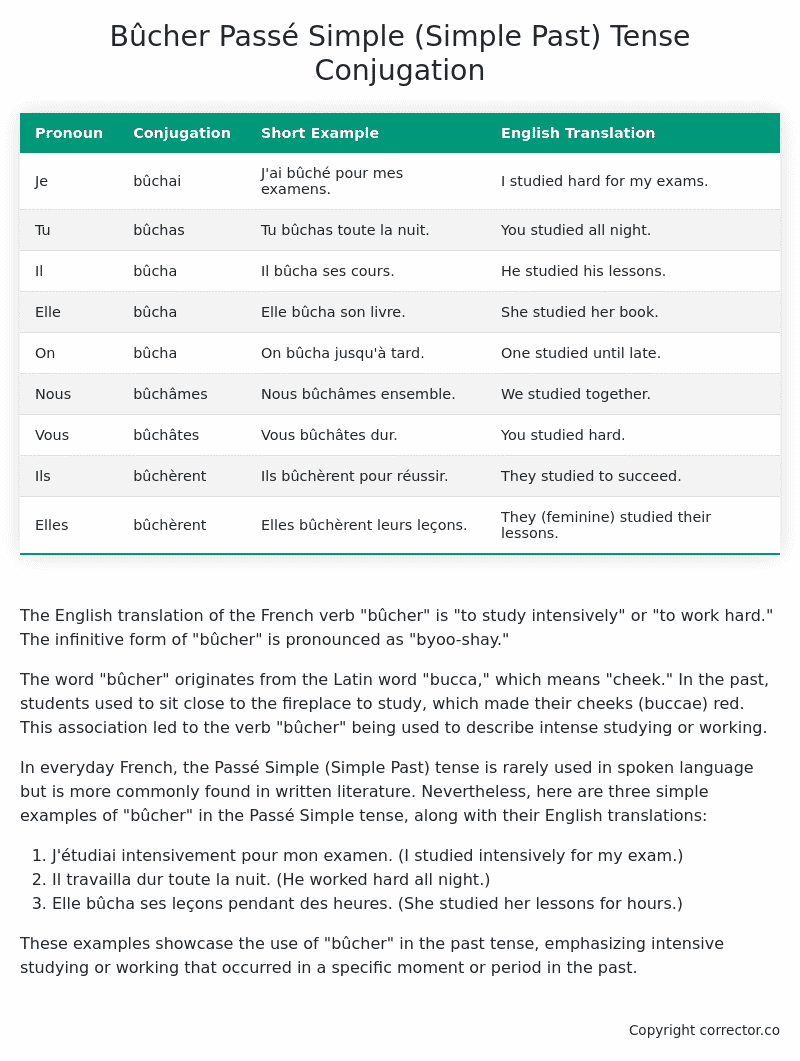Passé Simple (Simple Past) Tense Conjugation of the French Verb bûcher
Introduction to the verb bûcher
The English translation of the French verb “bûcher” is “to study intensively” or “to work hard.” The infinitive form of “bûcher” is pronounced as “byoo-shay.”
The word “bûcher” originates from the Latin word “bucca,” which means “cheek.” In the past, students used to sit close to the fireplace to study, which made their cheeks (buccae) red. This association led to the verb “bûcher” being used to describe intense studying or working.
In everyday French, the Passé Simple (Simple Past) tense is rarely used in spoken language but is more commonly found in written literature. Nevertheless, here are three simple examples of “bûcher” in the Passé Simple tense, along with their English translations:
- J’étudiai intensivement pour mon examen. (I studied intensively for my exam.)
- Il travailla dur toute la nuit. (He worked hard all night.)
- Elle bûcha ses leçons pendant des heures. (She studied her lessons for hours.)
These examples showcase the use of “bûcher” in the past tense, emphasizing intensive studying or working that occurred in a specific moment or period in the past.
Table of the Passé Simple (Simple Past) Tense Conjugation of bûcher
| Pronoun | Conjugation | Short Example | English Translation |
|---|---|---|---|
| Je | bûchai | J’ai bûché pour mes examens. | I studied hard for my exams. |
| Tu | bûchas | Tu bûchas toute la nuit. | You studied all night. |
| Il | bûcha | Il bûcha ses cours. | He studied his lessons. |
| Elle | bûcha | Elle bûcha son livre. | She studied her book. |
| On | bûcha | On bûcha jusqu’à tard. | One studied until late. |
| Nous | bûchâmes | Nous bûchâmes ensemble. | We studied together. |
| Vous | bûchâtes | Vous bûchâtes dur. | You studied hard. |
| Ils | bûchèrent | Ils bûchèrent pour réussir. | They studied to succeed. |
| Elles | bûchèrent | Elles bûchèrent leurs leçons. | They (feminine) studied their lessons. |
Other Conjugations for Bûcher.
Le Present (Present Tense) Conjugation of the French Verb bûcher
Imparfait (Imperfect) Tense Conjugation of the French Verb bûcher
Passé Simple (Simple Past) Tense Conjugation of the French Verb bûcher (You’re reading it right now!)
Passé Composé (Present Perfect) Tense Conjugation of the French Verb bûcher
Futur Simple (Simple Future) Tense Conjugation of the French Verb bûcher
Futur Proche (Near Future) Tense Conjugation of the French Verb bûcher
Plus-que-parfait (Pluperfect) Tense Conjugation of the French Verb bûcher
Passé Antérieur (Past Anterior) Tense Conjugation of the French Verb bûcher
Futur Antérieur (Future Anterior) Tense Conjugation of the French Verb bûcher
Subjonctif Présent (Subjunctive Present) Tense Conjugation of the French Verb bûcher
Subjonctif Passé (Subjunctive Past) Tense Conjugation of the French Verb bûcher
Subjonctif Imparfait (Subjunctive Imperfect) Tense Conjugation of the French Verb bûcher
Subjonctif Plus-que-parfait (Subjunctive Pluperfect) Tense Conjugation of the French Verb bûcher
Conditionnel Présent (Conditional Present) Tense Conjugation of the French Verb bûcher
Conditionnel Passé (Conditional Past) Tense Conjugation of the French Verb bûcher
Conditionnel Passé II (Conditional Past II) Tense Conjugation of the French Verb bûcher
L’impératif Présent (Imperative Present) Tense Conjugation of the French Verb bûcher
L’impératif Passé (Imperative Past) Tense Conjugation of the French Verb bûcher
L’infinitif Présent (Infinitive Present) Tense Conjugation of the French Verb bûcher
L’infinitif Passé (Infinitive Past) Tense Conjugation of the French Verb bûcher
Le Participe Présent (Present Participle) Tense Conjugation of the French Verb bûcher
Le Participe Passé (Past Participle) Tense Conjugation of the French Verb bûcher
Struggling with French verbs or the language in general? Why not use our free French Grammar Checker – no registration required!
Get a FREE Download Study Sheet of this Conjugation 🔥
Simply right click the image below, click “save image” and get your free reference for the bûcher Passé Simple tense conjugation!

Bûcher – About the French Passé Simple (Simple Past) Tense
Formation
Usage
Narration
Historical Context
Interactions with other tenses
Passé Composé
Imparfait
Conditional and Subjunctive
Summary
I hope you enjoyed this article on the verb bûcher. Still in a learning mood? Check out another TOTALLY random French verb conjugation!


